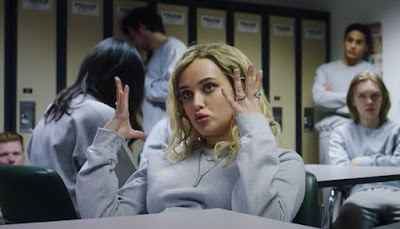The explosions are not a worldwide phenomenon, limited to one suburban high school’s senior class, including Mara (Langford) and her best friend Tess (Hayley Law). Together they meet this unexplained disturbance with nothing less than true teenage dispassion, acknowledging and recognizing their freaky, frightening reality even as they maintain distance through a comical veil of irony. That bubble is pierced, however, by Dylan (Charlie Plummer), the lanky kid with indie rocker hair. The explosions have caused Dylan to seize the day, thankfully without declaring carpe diem, confessing his crush to Mara and buying a new car by way of an old milk truck standing in for standing on his desk. Mara and Dylan are not opposites exactly, but in his gawkily earnest performance Plummer exudes a sense of Dylan being curious about and excited by Mara while Langford evokes sincerity in her affection for Dylan while never sacrificing her give-you-shit-all-the-time attitude.
Even as they fall in love, however, the specter of death consistently looms, coloring their relationship in the light of Romeo & Juliet-styled fatalism, every moment when they’re close together causing you not to swoon but scrunch up, wondering, “Is this it?” In trying to diagnose the problem and develop a cure for these explosive expirations, the government briefly locks them and their classmates down, leaving Mara’s parents (Piper Perapo and Rob Huebel) with little recourse. If Mara’s mother and father never become multi-dimensional characters, they never need to, epitomizing parents losing the ability to protect their child from the outside world, making their avowals of getting Mara to graduation no matter what ring sadly hollow. No one knows if graduation is the magical demarcation line, but the idea that it’s floated suggests “Spontaneous” as an allegory for the main objective of high school merely being to survive it, though Duffield might have been better to further accentuate that analogy.
Elsewhere his analogies are more successful. In one terrifying sequence, a chain of students combusting sends the rest of them running through the hallways of their school, incoherently screaming, evoking an active shooter situation. And if Duffield’s camera work brings home the frenzied nature of such a moment, just rushing forward without any exact thought as to what you’re going or what you’re doing, he also knows just when to cut between Mara and Dylan and Tess as they lose touch with one another in the scrum, unable to get inside the moment and slow it down. And each time throughout a film when a student dies, we see his or her image, sitting down for a photo, as if it’s been culled from a yearbook, accompanied by a brief remembrance in voiceover from Mara, giving death meaning and letting us mourn it rather than chalking up to cinematic collateral damage.
Even as they fall in love, however, the specter of death consistently looms, coloring their relationship in the light of Romeo & Juliet-styled fatalism, every moment when they’re close together causing you not to swoon but scrunch up, wondering, “Is this it?” In trying to diagnose the problem and develop a cure for these explosive expirations, the government briefly locks them and their classmates down, leaving Mara’s parents (Piper Perapo and Rob Huebel) with little recourse. If Mara’s mother and father never become multi-dimensional characters, they never need to, epitomizing parents losing the ability to protect their child from the outside world, making their avowals of getting Mara to graduation no matter what ring sadly hollow. No one knows if graduation is the magical demarcation line, but the idea that it’s floated suggests “Spontaneous” as an allegory for the main objective of high school merely being to survive it, though Duffield might have been better to further accentuate that analogy.
Elsewhere his analogies are more successful. In one terrifying sequence, a chain of students combusting sends the rest of them running through the hallways of their school, incoherently screaming, evoking an active shooter situation. And if Duffield’s camera work brings home the frenzied nature of such a moment, just rushing forward without any exact thought as to what you’re going or what you’re doing, he also knows just when to cut between Mara and Dylan and Tess as they lose touch with one another in the scrum, unable to get inside the moment and slow it down. And each time throughout a film when a student dies, we see his or her image, sitting down for a photo, as if it’s been culled from a yearbook, accompanied by a brief remembrance in voiceover from Mara, giving death meaning and letting us mourn it rather than chalking up to cinematic collateral damage.
If tonal shifts epitomizing teenage mood swings define the film, Duffield saves the biggest mood swing for last, plunging Mara into a depression any person who spent chunks of her/his adolescence wearing all black and laying on the floor and listening to The Smiths over and over and will instantly recognize. It’s hard to watch and Langford does not make it any easier, boldly refusing in these passages to surrender an inch on likability. In that way, we, the audience, become akin to her parents, trying to find that love in our hearts in spite of how she’s acting, understanding what she’s going through, a member of Gen Z recast as The Lost Generation’s young Alvy of “Annie Hall” realizing the Universe is expanding means the eventual end of everything. No, by God, you have to get out there and live, a dime-store truth that “Spontaneous” renders truthful enough by not tying it up in a bow and instead delivering it with a flood of emotion.





No comments:
Post a Comment